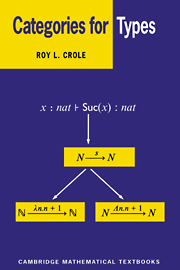4 - Functional Type Theory
Published online by Cambridge University Press: 05 June 2012
Summary
Introduction
Discussion 4.1.1 Our task now is to develop a categorical type theory correspondence for an equational type theory based on the “simply typed λ-calculus.” It will be helpful if the reader has a nodding acquaintance with simply typed λ-calculus, but this is not crucial. Let us review in an informal fashion the basic principles involved. Originally, the λ-calculus developed from attempts to produce a notation for representing and calculating with functions. (Strictly speaking, the original work in this area was concerned with (a primitive form of) a system now known as the untyped λ-calculus, but we shall not worry about such details in this very superficial discussion). Consider an expression such as x + y. We might think of this as being a definition of a function f given by x ↦ x + y (where the value of y is constant), or as a function g defined by y ↦ x + y (where the value of x is held constant). In day to day working life, mathematicians deal with such niceties simply by using ad hoc notations, and letting a context of discussion allow an intelligent reader to deduce precisely what the author means by his ad hoc notation. However, present day computers are not quite as intelligent as the typical reader, and it is essential to develop precise notations and syntax in order to program up mathematical functions. The λ-calculus is a formalism for dealing with these problems.
- Type
- Chapter
- Information
- Categories for Types , pp. 154 - 200Publisher: Cambridge University PressPrint publication year: 1994



